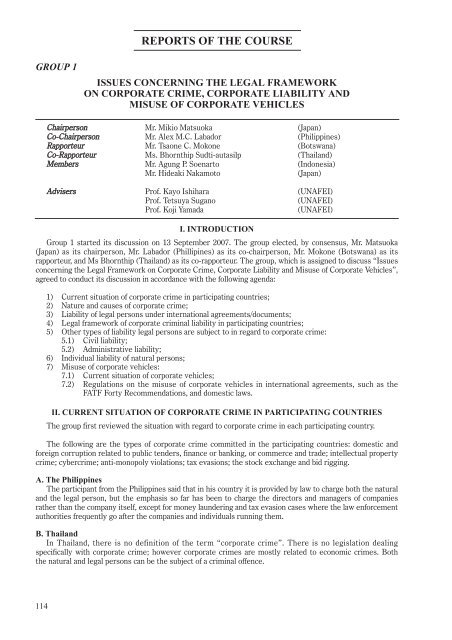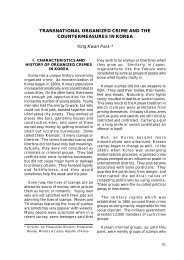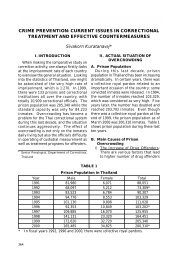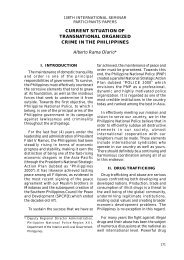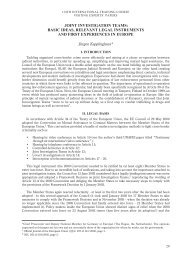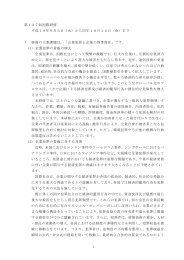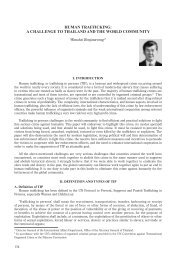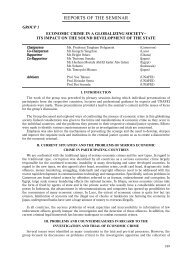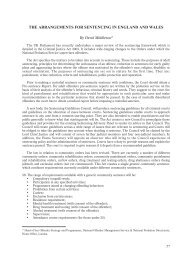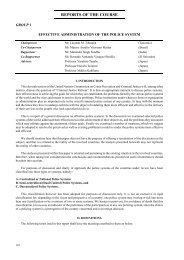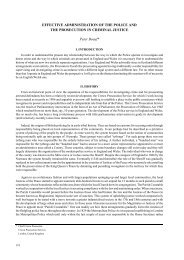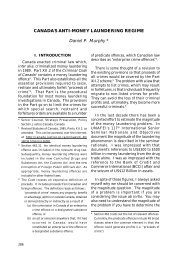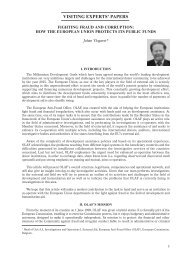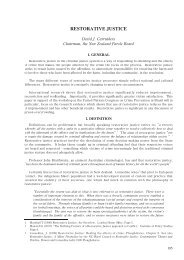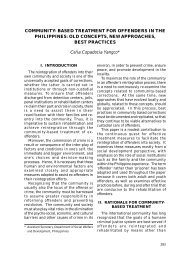Issues Concerning the Legal Framework on Corporate Crime ...
Issues Concerning the Legal Framework on Corporate Crime ...
Issues Concerning the Legal Framework on Corporate Crime ...
You also want an ePaper? Increase the reach of your titles
YUMPU automatically turns print PDFs into web optimized ePapers that Google loves.
REPORTS OF THE COURSE<br />
GROUP 1<br />
ISSUES CONCERNING THE LEGAL FRAMEWORK<br />
ON CORPORATE CRIME, CORPORATE LIABILITY AND<br />
MISUSE OF CORPORATE VEHICLES<br />
Chairpers<strong>on</strong> Mr. Mikio Matsuoka (Japan)<br />
Co-Chairpers<strong>on</strong> Mr. Alex M.C. Labador (Philippines)<br />
Rapporteur Mr. Tsa<strong>on</strong>e C. Mok<strong>on</strong>e (Botswana)<br />
Co-Rapporteur Ms. Bhornthip Sudti-autasilp (Thailand)<br />
Members Mr. Agung P. Soenarto (Ind<strong>on</strong>esia)<br />
Mr. Hideaki Nakamoto<br />
(Japan)<br />
Advisers Prof. Kayo Ishihara (UNAFEI)<br />
Prof. Tetsuya Sugano<br />
(UNAFEI)<br />
Prof. Koji Yamada<br />
(UNAFEI)<br />
I. INTRODUCTION<br />
Group 1 started its discussi<strong>on</strong> <strong>on</strong> 13 September 2007. The group elected, by c<strong>on</strong>sensus, Mr. Matsuoka<br />
(Japan) as its chairpers<strong>on</strong>, Mr. Labador (Phillipines) as its co-chairpers<strong>on</strong>, Mr. Mok<strong>on</strong>e (Botswana) as its<br />
rapporteur, and Ms Bhornthip (Thailand) as its co-rapporteur. The group, which is assigned to discuss “<str<strong>on</strong>g>Issues</str<strong>on</strong>g><br />
c<strong>on</strong>cerning <str<strong>on</strong>g>the</str<strong>on</strong>g> <str<strong>on</strong>g>Legal</str<strong>on</strong>g> <str<strong>on</strong>g>Framework</str<strong>on</strong>g> <strong>on</strong> <strong>Corporate</strong> <strong>Crime</strong>, <strong>Corporate</strong> Liability and Misuse of <strong>Corporate</strong> Vehicles”,<br />
agreed to c<strong>on</strong>duct its discussi<strong>on</strong> in accordance with <str<strong>on</strong>g>the</str<strong>on</strong>g> following agenda:<br />
1) Current situati<strong>on</strong> of corporate crime in participating countries;<br />
2) Nature and causes of corporate crime;<br />
3) Liability of legal pers<strong>on</strong>s under internati<strong>on</strong>al agreements/documents;<br />
4) <str<strong>on</strong>g>Legal</str<strong>on</strong>g> framework of corporate criminal liability in participating countries;<br />
5) O<str<strong>on</strong>g>the</str<strong>on</strong>g>r types of liability legal pers<strong>on</strong>s are subject to in regard to corporate crime:<br />
5.1) Civil liability;<br />
5.2) Administrative liability;<br />
6) Individual liability of natural pers<strong>on</strong>s;<br />
7) Misuse of corporate vehicles:<br />
7.1) Current situati<strong>on</strong> of corporate vehicles;<br />
7.2) Regulati<strong>on</strong>s <strong>on</strong> <str<strong>on</strong>g>the</str<strong>on</strong>g> misuse of corporate vehicles in internati<strong>on</strong>al agreements, such as <str<strong>on</strong>g>the</str<strong>on</strong>g><br />
FATF Forty Recommendati<strong>on</strong>s, and domestic laws.<br />
II. CURRENT SITUATION OF CORPORATE CRIME IN PARTICIPATING COUNTRIES<br />
The group first reviewed <str<strong>on</strong>g>the</str<strong>on</strong>g> situati<strong>on</strong> with regard to corporate crime in each participating country.<br />
The following are <str<strong>on</strong>g>the</str<strong>on</strong>g> types of corporate crime committed in <str<strong>on</strong>g>the</str<strong>on</strong>g> participating countries: domestic and<br />
foreign corrupti<strong>on</strong> related to public tenders, finance or banking, or commerce and trade; intellectual property<br />
crime; cybercrime; anti-m<strong>on</strong>opoly violati<strong>on</strong>s; tax evasi<strong>on</strong>s; <str<strong>on</strong>g>the</str<strong>on</strong>g> stock exchange and bid rigging.<br />
A. The Philippines<br />
The participant from <str<strong>on</strong>g>the</str<strong>on</strong>g> Philippines said that in his country it is provided by law to charge both <str<strong>on</strong>g>the</str<strong>on</strong>g> natural<br />
and <str<strong>on</strong>g>the</str<strong>on</strong>g> legal pers<strong>on</strong>, but <str<strong>on</strong>g>the</str<strong>on</strong>g> emphasis so far has been to charge <str<strong>on</strong>g>the</str<strong>on</strong>g> directors and managers of companies<br />
ra<str<strong>on</strong>g>the</str<strong>on</strong>g>r than <str<strong>on</strong>g>the</str<strong>on</strong>g> company itself, except for m<strong>on</strong>ey laundering and tax evasi<strong>on</strong> cases where <str<strong>on</strong>g>the</str<strong>on</strong>g> law enforcement<br />
authorities frequently go after <str<strong>on</strong>g>the</str<strong>on</strong>g> companies and individuals running <str<strong>on</strong>g>the</str<strong>on</strong>g>m.<br />
B. Thailand<br />
In Thailand, <str<strong>on</strong>g>the</str<strong>on</strong>g>re is no definiti<strong>on</strong> of <str<strong>on</strong>g>the</str<strong>on</strong>g> term “corporate crime”. There is no legislati<strong>on</strong> dealing<br />
specifically with corporate crime; however corporate crimes are mostly related to ec<strong>on</strong>omic crimes. Both<br />
<str<strong>on</strong>g>the</str<strong>on</strong>g> natural and legal pers<strong>on</strong>s can be <str<strong>on</strong>g>the</str<strong>on</strong>g> subject of a criminal offence.<br />
114
137TH INTERNATIONAL TRAINING COURSE<br />
REPORTS OF THE COURSE<br />
C. Japan<br />
According to Japanese law, a company itself cannot commit a crime, but directors, managers and<br />
employees can. A double punishment does exist in Japan for certain offences, under which a legal pers<strong>on</strong> can<br />
be held criminally liable under c<strong>on</strong>diti<strong>on</strong>s described later. Some of <str<strong>on</strong>g>the</str<strong>on</strong>g>se offences are committed in <str<strong>on</strong>g>the</str<strong>on</strong>g><br />
course of business by companies that in general terms are c<strong>on</strong>ducting legitimate activities, whereas some of<br />
<str<strong>on</strong>g>the</str<strong>on</strong>g>m are committed by companies organized for <str<strong>on</strong>g>the</str<strong>on</strong>g> purpose of committing crimes.<br />
D. Ind<strong>on</strong>esia<br />
Development policy which prioritizes ec<strong>on</strong>omic growth produces giant corporati<strong>on</strong>s and c<strong>on</strong>glomerati<strong>on</strong>s<br />
dominating and m<strong>on</strong>opolizing <str<strong>on</strong>g>the</str<strong>on</strong>g> Ind<strong>on</strong>esian ec<strong>on</strong>omy which is still full of corrupti<strong>on</strong>, collusi<strong>on</strong> and<br />
nepotism, said <str<strong>on</strong>g>the</str<strong>on</strong>g> participant from Ind<strong>on</strong>esia. The development of corporati<strong>on</strong>s tends to have an expansive<br />
negative impact in which, <strong>on</strong> legal grounds, an acti<strong>on</strong> committed by a corporati<strong>on</strong> shall be a criminal act.<br />
Comm<strong>on</strong>ly, it’s related with ec<strong>on</strong>omic or financial interest and also to take financial advantage in which <str<strong>on</strong>g>the</str<strong>on</strong>g><br />
acti<strong>on</strong> shall be an ec<strong>on</strong>omic crime such as corrupti<strong>on</strong>, m<strong>on</strong>opoly practice, tax evasi<strong>on</strong>, etc. Both <str<strong>on</strong>g>the</str<strong>on</strong>g> natural<br />
and legal pers<strong>on</strong>s are held liable for corporate crimes, but legal pers<strong>on</strong>s have never been prosecuted for<br />
ec<strong>on</strong>omic crimes.<br />
E. Botswana<br />
The participant from Botswana said that <str<strong>on</strong>g>the</str<strong>on</strong>g> law provides for <str<strong>on</strong>g>the</str<strong>on</strong>g> punishment of both <str<strong>on</strong>g>the</str<strong>on</strong>g> natural and legal<br />
pers<strong>on</strong>s, but mostly <str<strong>on</strong>g>the</str<strong>on</strong>g> c<strong>on</strong>centrati<strong>on</strong> has been <strong>on</strong> charging <str<strong>on</strong>g>the</str<strong>on</strong>g> directors and managers.<br />
It was evident from <str<strong>on</strong>g>the</str<strong>on</strong>g> discussi<strong>on</strong>s that prosecuti<strong>on</strong> against legal pers<strong>on</strong>s is rare in many countries and<br />
this is attributable mainly to <str<strong>on</strong>g>the</str<strong>on</strong>g> following reas<strong>on</strong>s: <str<strong>on</strong>g>the</str<strong>on</strong>g> law is insufficient in providing c<strong>on</strong>diti<strong>on</strong>s to apply;<br />
<str<strong>on</strong>g>the</str<strong>on</strong>g>re is a low level of awareness am<strong>on</strong>g <str<strong>on</strong>g>the</str<strong>on</strong>g> law enforcement authorities of <str<strong>on</strong>g>the</str<strong>on</strong>g> necessity of going after<br />
companies as such; <str<strong>on</strong>g>the</str<strong>on</strong>g>re are difficulties in proving <str<strong>on</strong>g>the</str<strong>on</strong>g> c<strong>on</strong>diti<strong>on</strong>s for attributing liability to legal pers<strong>on</strong>s;<br />
and <str<strong>on</strong>g>the</str<strong>on</strong>g>re is fear of <str<strong>on</strong>g>the</str<strong>on</strong>g> possible ec<strong>on</strong>omic impact <strong>on</strong> <str<strong>on</strong>g>the</str<strong>on</strong>g> public when <str<strong>on</strong>g>the</str<strong>on</strong>g> company as such is punished.<br />
Although in many of <str<strong>on</strong>g>the</str<strong>on</strong>g> participating countries prosecuti<strong>on</strong> against corporati<strong>on</strong>s is rare, <str<strong>on</strong>g>the</str<strong>on</strong>g> group<br />
unanimously agreed that it is necessary to investigate and prosecute companies to tackle this problem.<br />
III. NATURE AND CAUSES OF CORPORATE CRIMES<br />
The nature and causes of corporate crime were more or less similar in most of <str<strong>on</strong>g>the</str<strong>on</strong>g> participating countries<br />
and were summarized as follows:<br />
• Related mostly to ec<strong>on</strong>omic crime;<br />
• Often complicated and difficult to detect;<br />
• Provides no physical harm to <str<strong>on</strong>g>the</str<strong>on</strong>g> victims, hence a lack of visual or obvious evidence;<br />
• Committed by high rank individuals or educated people in charge of <str<strong>on</strong>g>the</str<strong>on</strong>g> corporati<strong>on</strong>;<br />
• In many countries it is for <str<strong>on</strong>g>the</str<strong>on</strong>g> profit or benefit of both <str<strong>on</strong>g>the</str<strong>on</strong>g> individuals and <str<strong>on</strong>g>the</str<strong>on</strong>g> companies whereas in<br />
Japan, it is committed mostly for <str<strong>on</strong>g>the</str<strong>on</strong>g> profit or benefit of <str<strong>on</strong>g>the</str<strong>on</strong>g> companies, especially large companies;<br />
• Some financial instituti<strong>on</strong>s in some countries are not sufficiently co-operating with law enforcement<br />
agencies in giving informati<strong>on</strong>;<br />
• Increased computerizati<strong>on</strong> of financial documents creates electr<strong>on</strong>ic data (and evidence) which is<br />
easily destroyed or altered. Perpetrators are also using modern technology to commit crimes,<br />
making <str<strong>on</strong>g>the</str<strong>on</strong>g>m difficult to detect;<br />
• <strong>Corporate</strong> crime is related to organized and transnati<strong>on</strong>al crimes or is committed by organized<br />
criminals and is thus so difficult to investigate;<br />
• <strong>Corporate</strong> crime is not fully investigated, and law enforcement agents lack capacity and capability;<br />
• In <strong>on</strong>e country, corrupti<strong>on</strong> of law enforcement agents facilitates <str<strong>on</strong>g>the</str<strong>on</strong>g> commissi<strong>on</strong> of <str<strong>on</strong>g>the</str<strong>on</strong>g> offence;<br />
• In some countries, corporati<strong>on</strong>s are used as a vehicle for m<strong>on</strong>ey laundering or for obtaining unlawful<br />
benefits;<br />
• In some countries, legal systems are not fully functi<strong>on</strong>ing and regulati<strong>on</strong>s are not strictly adhered to;<br />
• <strong>Corporate</strong> crime is sometimes committed to take advantage of loopholes in nati<strong>on</strong>al legislati<strong>on</strong>.<br />
115
RESOURCE MATERIAL SERIES No.76<br />
IV. LIABILITY OF LEGAL PERSONS UNDER INTERNATIONAL<br />
AGREEMENTS/DOCUMENTS<br />
There is no internati<strong>on</strong>al agreement directly relating to corporate crime as such, however <str<strong>on</strong>g>the</str<strong>on</strong>g>re are various<br />
internati<strong>on</strong>al agreements related to corporate crime. Some of <str<strong>on</strong>g>the</str<strong>on</strong>g>se are <str<strong>on</strong>g>the</str<strong>on</strong>g> United Nati<strong>on</strong>s C<strong>on</strong>venti<strong>on</strong> against<br />
Corrupti<strong>on</strong>, <str<strong>on</strong>g>the</str<strong>on</strong>g> Council of Europe Criminal Law C<strong>on</strong>venti<strong>on</strong> <strong>on</strong> Corrupti<strong>on</strong>, <str<strong>on</strong>g>the</str<strong>on</strong>g> 40 Recommendati<strong>on</strong>s of <str<strong>on</strong>g>the</str<strong>on</strong>g><br />
Financial Acti<strong>on</strong> Task Force (FATF), and <str<strong>on</strong>g>the</str<strong>on</strong>g> Council of Europe C<strong>on</strong>venti<strong>on</strong> <strong>on</strong> Cybercrime, just to menti<strong>on</strong> a<br />
few. Article 26 of <str<strong>on</strong>g>the</str<strong>on</strong>g> UNCAC has <str<strong>on</strong>g>the</str<strong>on</strong>g> typical elements of an internati<strong>on</strong>al agreement pertaining to <str<strong>on</strong>g>the</str<strong>on</strong>g> liability<br />
of legal pers<strong>on</strong>s. It was evident from <str<strong>on</strong>g>the</str<strong>on</strong>g> discussi<strong>on</strong>s that most countries have signed <str<strong>on</strong>g>the</str<strong>on</strong>g>se internati<strong>on</strong>al<br />
agreements, but what was lacking was <str<strong>on</strong>g>the</str<strong>on</strong>g> implementati<strong>on</strong> of <str<strong>on</strong>g>the</str<strong>on</strong>g> “liability of legal pers<strong>on</strong>s” clauses.<br />
The group agreed that as stipulated in <str<strong>on</strong>g>the</str<strong>on</strong>g>se provisi<strong>on</strong>s, a country may take different approaches to<br />
implement <str<strong>on</strong>g>the</str<strong>on</strong>g>se requirements but it should be effective enough to tackle corporate crime and be<br />
implemented in law and in practice.<br />
V. LEGAL FRAMEWORK OF CORPORATE CRIMINAL LIABILITY IN<br />
PARTICIPATING COUNTRIES<br />
A. Thailand<br />
In Thailand, a corporati<strong>on</strong> can be defined in law as a legal pers<strong>on</strong>. Once it is created, it is separated from<br />
its shareholders and can enjoy <str<strong>on</strong>g>the</str<strong>on</strong>g> same rights and is subject to <str<strong>on</strong>g>the</str<strong>on</strong>g> same duties as a natural pers<strong>on</strong>. The will<br />
of a legal pers<strong>on</strong> is declared through its representatives.<br />
As for criminal liability of a legal pers<strong>on</strong>, <str<strong>on</strong>g>the</str<strong>on</strong>g>re is still c<strong>on</strong>troversy in Thailand as to whe<str<strong>on</strong>g>the</str<strong>on</strong>g>r a legal<br />
pers<strong>on</strong> can be <str<strong>on</strong>g>the</str<strong>on</strong>g> subject of a criminal offence and be held liable. There are two opini<strong>on</strong>s <strong>on</strong> this matter. But<br />
before discussing this issue it is important to explain <str<strong>on</strong>g>the</str<strong>on</strong>g> different types of criminal legislati<strong>on</strong> in Thailand.<br />
The first is where <str<strong>on</strong>g>the</str<strong>on</strong>g> provisi<strong>on</strong> in <str<strong>on</strong>g>the</str<strong>on</strong>g> legislati<strong>on</strong> clearly states that a legal pers<strong>on</strong> is <str<strong>on</strong>g>the</str<strong>on</strong>g> subject of a crime<br />
and can be criminally charged, such as <str<strong>on</strong>g>the</str<strong>on</strong>g> Anti-M<strong>on</strong>ey Laundering Act 1999, Secti<strong>on</strong> 61. The sec<strong>on</strong>d is<br />
when <str<strong>on</strong>g>the</str<strong>on</strong>g> legislati<strong>on</strong> specifies that <str<strong>on</strong>g>the</str<strong>on</strong>g> subject of <str<strong>on</strong>g>the</str<strong>on</strong>g> offence is a pers<strong>on</strong> of certain status or positi<strong>on</strong>. For<br />
example, under <str<strong>on</strong>g>the</str<strong>on</strong>g> Mining Act B.E. 2461(A.D. 1918), <str<strong>on</strong>g>the</str<strong>on</strong>g> Act imposes criminal liability for a mining<br />
c<strong>on</strong>cessi<strong>on</strong>aire who violates <str<strong>on</strong>g>the</str<strong>on</strong>g> provisi<strong>on</strong> of such Act. In this case, <str<strong>on</strong>g>the</str<strong>on</strong>g> subject of <str<strong>on</strong>g>the</str<strong>on</strong>g> offence is <str<strong>on</strong>g>the</str<strong>on</strong>g> mining<br />
c<strong>on</strong>cessi<strong>on</strong>aire. The third is where <str<strong>on</strong>g>the</str<strong>on</strong>g> legislati<strong>on</strong> does not state clearly who is <str<strong>on</strong>g>the</str<strong>on</strong>g> subject of <str<strong>on</strong>g>the</str<strong>on</strong>g> offence.<br />
This is <str<strong>on</strong>g>the</str<strong>on</strong>g> case of <str<strong>on</strong>g>the</str<strong>on</strong>g> Penal Code, which is <str<strong>on</strong>g>the</str<strong>on</strong>g> major criminal law in Thailand, and o<str<strong>on</strong>g>the</str<strong>on</strong>g>r laws which c<strong>on</strong>tain<br />
criminal provisi<strong>on</strong>s. The term used in <str<strong>on</strong>g>the</str<strong>on</strong>g> third type of laws is “anybody” without fur<str<strong>on</strong>g>the</str<strong>on</strong>g>r definiti<strong>on</strong> of such<br />
term. This is <str<strong>on</strong>g>the</str<strong>on</strong>g> category which is obscured and c<strong>on</strong>troversial. It is argued whe<str<strong>on</strong>g>the</str<strong>on</strong>g>r or not such term<br />
includes legal pers<strong>on</strong>s.<br />
There are two opini<strong>on</strong>s <strong>on</strong> this matter. The first is that of legal academics who base <str<strong>on</strong>g>the</str<strong>on</strong>g>ir opini<strong>on</strong> <strong>on</strong> <str<strong>on</strong>g>the</str<strong>on</strong>g><br />
grounds that a legal pers<strong>on</strong> is merely a fictitious pers<strong>on</strong> and does not have a mind of its own to commit an<br />
offence. It thus lacks malice. In additi<strong>on</strong>, a legal pers<strong>on</strong> can be punished <strong>on</strong>ly when <str<strong>on</strong>g>the</str<strong>on</strong>g> law says so. If <str<strong>on</strong>g>the</str<strong>on</strong>g>re<br />
is no specific law, <str<strong>on</strong>g>the</str<strong>on</strong>g> legal pers<strong>on</strong> cannot be punished. This is according to <str<strong>on</strong>g>the</str<strong>on</strong>g> legal principle “no law, no<br />
punishment”. Therefore, a legal pers<strong>on</strong> cannot be a subject of such criminal offences and cannot be<br />
punished.<br />
The sec<strong>on</strong>d opini<strong>on</strong> is that of <str<strong>on</strong>g>the</str<strong>on</strong>g> Supreme Court. The Supreme Court has been c<strong>on</strong>tinuously deciding<br />
that a legal pers<strong>on</strong> can be held liable since a legal pers<strong>on</strong>’s will is declared through its representative.<br />
Therefore, <str<strong>on</strong>g>the</str<strong>on</strong>g> act of <str<strong>on</strong>g>the</str<strong>on</strong>g> representatives is <str<strong>on</strong>g>the</str<strong>on</strong>g> act of that legal pers<strong>on</strong> provided that <str<strong>on</strong>g>the</str<strong>on</strong>g> representatives act<br />
in <str<strong>on</strong>g>the</str<strong>on</strong>g> business of and in <str<strong>on</strong>g>the</str<strong>on</strong>g> name of <str<strong>on</strong>g>the</str<strong>on</strong>g> legal pers<strong>on</strong>. In c<strong>on</strong>clusi<strong>on</strong>, <str<strong>on</strong>g>the</str<strong>on</strong>g> Supreme Court has interpreted <str<strong>on</strong>g>the</str<strong>on</strong>g><br />
term “anybody” to cover not <strong>on</strong>ly natural pers<strong>on</strong>s but also legal pers<strong>on</strong>s. Examples of <str<strong>on</strong>g>the</str<strong>on</strong>g> offences of which<br />
<str<strong>on</strong>g>the</str<strong>on</strong>g> Supreme Court has held that <str<strong>on</strong>g>the</str<strong>on</strong>g> legal pers<strong>on</strong> can be <str<strong>on</strong>g>the</str<strong>on</strong>g> subject are refusal to comply with a lawful order<br />
of an official, cheating and fraud, and taking false informati<strong>on</strong> to charge a pers<strong>on</strong> in court. The offences<br />
charged in <str<strong>on</strong>g>the</str<strong>on</strong>g>se decisi<strong>on</strong>s were offences which require intenti<strong>on</strong>. However, <str<strong>on</strong>g>the</str<strong>on</strong>g> Supreme Court also decided<br />
that <str<strong>on</strong>g>the</str<strong>on</strong>g> legal pers<strong>on</strong> could also be held liable for a negligent act. In additi<strong>on</strong>, <str<strong>on</strong>g>the</str<strong>on</strong>g> Supreme Court decided that<br />
a legal pers<strong>on</strong> could be a subject of o<str<strong>on</strong>g>the</str<strong>on</strong>g>r law which has criminal provisi<strong>on</strong>s, such as <str<strong>on</strong>g>the</str<strong>on</strong>g> Act <strong>on</strong> <str<strong>on</strong>g>the</str<strong>on</strong>g> Misuse of<br />
Cheques B.E. 2497(1954).<br />
However, under Secti<strong>on</strong> 18 of <str<strong>on</strong>g>the</str<strong>on</strong>g> Thai Penal Code, <str<strong>on</strong>g>the</str<strong>on</strong>g> allowable criminal liability or punishments are <str<strong>on</strong>g>the</str<strong>on</strong>g><br />
116
137TH INTERNATIONAL TRAINING COURSE<br />
REPORTS OF THE COURSE<br />
following: (1) death (or life sentence); (2) impris<strong>on</strong>ment; (3) c<strong>on</strong>finement; (4) fine; and (5) forfeiture of<br />
property. The Penal Code is <str<strong>on</strong>g>the</str<strong>on</strong>g> major criminal law in Thailand. The <strong>on</strong>ly allowable penalties in any o<str<strong>on</strong>g>the</str<strong>on</strong>g>r<br />
criminal legislati<strong>on</strong> must be <str<strong>on</strong>g>the</str<strong>on</strong>g>se five types of penalties. This is a legal pitfall since death, impris<strong>on</strong>ment and<br />
c<strong>on</strong>finement cannot be imposed up<strong>on</strong> a legal pers<strong>on</strong>. Thus <strong>on</strong>ly fine and forfeiture are <str<strong>on</strong>g>the</str<strong>on</strong>g> possible sancti<strong>on</strong>s<br />
for a legal pers<strong>on</strong>. When compared to <str<strong>on</strong>g>the</str<strong>on</strong>g> m<strong>on</strong>etary benefit a legal pers<strong>on</strong> obtains from such crimes, <str<strong>on</strong>g>the</str<strong>on</strong>g><br />
maximum fine under Secti<strong>on</strong> 61 of <str<strong>on</strong>g>the</str<strong>on</strong>g> AMLA, which is <strong>on</strong>e milli<strong>on</strong> baht, is minimal. Regarding forfeiture of<br />
assets, such property has to be that used to commit <str<strong>on</strong>g>the</str<strong>on</strong>g> crime or obtained from such crime. Therefore, it is<br />
doubtful whe<str<strong>on</strong>g>the</str<strong>on</strong>g>r <str<strong>on</strong>g>the</str<strong>on</strong>g>se criminal sancti<strong>on</strong>s are appropriate or sufficient to prevent a corporati<strong>on</strong> from<br />
committing crime.<br />
B. Ind<strong>on</strong>esia<br />
In Ind<strong>on</strong>esia, <str<strong>on</strong>g>the</str<strong>on</strong>g> legal framework of corporate criminal liability could be looked at in two different ways:<br />
<str<strong>on</strong>g>the</str<strong>on</strong>g> Penal Code and <str<strong>on</strong>g>the</str<strong>on</strong>g> Special <strong>Crime</strong> Law. The Penal Code states <str<strong>on</strong>g>the</str<strong>on</strong>g> principle that it is <strong>on</strong>ly human beings<br />
who can commit criminal acts (be <str<strong>on</strong>g>the</str<strong>on</strong>g> subject of a criminal act). In <str<strong>on</strong>g>the</str<strong>on</strong>g> event that <str<strong>on</strong>g>the</str<strong>on</strong>g>re is a criminal act in<br />
relati<strong>on</strong> to a corporati<strong>on</strong>, <str<strong>on</strong>g>the</str<strong>on</strong>g> liability for its crime, by <str<strong>on</strong>g>the</str<strong>on</strong>g> virtue of Penal Code, shall be duly borne by <str<strong>on</strong>g>the</str<strong>on</strong>g><br />
corporati<strong>on</strong> management so made to present <strong>on</strong> behalf of and in <str<strong>on</strong>g>the</str<strong>on</strong>g> name of corporati<strong>on</strong>. Meanwhile, those<br />
corporati<strong>on</strong> managements who are not involved in such criminal acts shall not be prosecuted.<br />
Criminal law o<str<strong>on</strong>g>the</str<strong>on</strong>g>r than <str<strong>on</strong>g>the</str<strong>on</strong>g> Penal Code has stipulated corporati<strong>on</strong>s as <str<strong>on</strong>g>the</str<strong>on</strong>g> subject of criminal acts, in<br />
additi<strong>on</strong> to human beings. In 1951, for <str<strong>on</strong>g>the</str<strong>on</strong>g> first time, it was applied in <str<strong>on</strong>g>the</str<strong>on</strong>g> urgent law regarding commodities<br />
stockpiling. The principle of corporati<strong>on</strong>s’ criminal liability was <str<strong>on</strong>g>the</str<strong>on</strong>g>n adopted in various laws o<str<strong>on</strong>g>the</str<strong>on</strong>g>r than <str<strong>on</strong>g>the</str<strong>on</strong>g><br />
Penal Code, such as laws regarding tax, capital markets, eradicati<strong>on</strong> of corrupti<strong>on</strong>, m<strong>on</strong>ey laundering, etc. In<br />
order for a corporati<strong>on</strong> to be held criminally liable, a ‘directing mind’ shall commit <str<strong>on</strong>g>the</str<strong>on</strong>g> offence. The term<br />
‘directing mind’ refers to directors, managers, owners and also de facto owners. The principal penalty for a<br />
corporati<strong>on</strong> is fine. As for additi<strong>on</strong>al criminal penalties, revoking of business licences and liquidati<strong>on</strong> are<br />
available. Criminal sancti<strong>on</strong>s are <strong>on</strong>ly enforced as a last resort after any o<str<strong>on</strong>g>the</str<strong>on</strong>g>r civil or administrative<br />
sancti<strong>on</strong>s.<br />
C. Japan<br />
According to Japanese law, a company itself cannot commit a crime, but directors, managers and<br />
employees can. However a double punishment does exist in Japan in many specific laws, such as tax law;<br />
anti-m<strong>on</strong>opoly law; anti-organized crime law; securities and exchange law; company law; unfair competiti<strong>on</strong><br />
law, including foreign bribery; but not in <str<strong>on</strong>g>the</str<strong>on</strong>g> Penal Code. Under <str<strong>on</strong>g>the</str<strong>on</strong>g> double punishment provisi<strong>on</strong>s, when any<br />
representative, agent, employee or o<str<strong>on</strong>g>the</str<strong>on</strong>g>r pers<strong>on</strong> engaging in <str<strong>on</strong>g>the</str<strong>on</strong>g> business of a legal pers<strong>on</strong> commits an<br />
offence in c<strong>on</strong>necti<strong>on</strong> with <str<strong>on</strong>g>the</str<strong>on</strong>g> business of such legal pers<strong>on</strong>, <str<strong>on</strong>g>the</str<strong>on</strong>g> fine shall be imposed <strong>on</strong> such legal pers<strong>on</strong><br />
in additi<strong>on</strong> to punishing <str<strong>on</strong>g>the</str<strong>on</strong>g> actor, unless <str<strong>on</strong>g>the</str<strong>on</strong>g> legal pers<strong>on</strong> can prove that <str<strong>on</strong>g>the</str<strong>on</strong>g> legal pers<strong>on</strong> has taken all<br />
necessary measures in its assignment, supervisi<strong>on</strong> and/or o<str<strong>on</strong>g>the</str<strong>on</strong>g>r duties in order to prevent such an<br />
individual(s) from committing <str<strong>on</strong>g>the</str<strong>on</strong>g> crime (this negligence of <str<strong>on</strong>g>the</str<strong>on</strong>g> legal pers<strong>on</strong> is presumed).<br />
A natural pers<strong>on</strong> who is capable of being <str<strong>on</strong>g>the</str<strong>on</strong>g> subject of <str<strong>on</strong>g>the</str<strong>on</strong>g> crime can ei<str<strong>on</strong>g>the</str<strong>on</strong>g>r be a director or an employee.<br />
It is usually important to identify a specific pers<strong>on</strong> in <str<strong>on</strong>g>the</str<strong>on</strong>g> company who has committed an offence.<br />
The penalty for a legal pers<strong>on</strong> (provided that <str<strong>on</strong>g>the</str<strong>on</strong>g>re is a double punishment provisi<strong>on</strong>) is a fine.<br />
D. Botswana<br />
In Botswana, a corporati<strong>on</strong> is defined in law as a legal pers<strong>on</strong>. Once it is created, it is separated from its<br />
shareholders and can enjoy <str<strong>on</strong>g>the</str<strong>on</strong>g> same rights and is subject to <str<strong>on</strong>g>the</str<strong>on</strong>g> same duties as a natural pers<strong>on</strong>, according<br />
to <str<strong>on</strong>g>the</str<strong>on</strong>g> Botswana Companies Act. Secti<strong>on</strong> 24 of <str<strong>on</strong>g>the</str<strong>on</strong>g> Penal Code states that where an offence is committed by<br />
any company or o<str<strong>on</strong>g>the</str<strong>on</strong>g>r body corporate, or any society, associati<strong>on</strong> or body of pers<strong>on</strong>s, every pers<strong>on</strong> charged<br />
with, or c<strong>on</strong>cerned or acting in <str<strong>on</strong>g>the</str<strong>on</strong>g> c<strong>on</strong>trol or management of <str<strong>on</strong>g>the</str<strong>on</strong>g> affairs or activities of such company or<br />
body corporate shall be guilty of that offence and liable to be punished accordingly, unless it is proved by<br />
such pers<strong>on</strong> that, through no act or omissi<strong>on</strong> <strong>on</strong> his or her part, he or she was not aware that <str<strong>on</strong>g>the</str<strong>on</strong>g> offence was<br />
being or was intended or was about to be committed, or that he or she took all reas<strong>on</strong>able steps to prevent<br />
its commissi<strong>on</strong>. The sancti<strong>on</strong>s against <str<strong>on</strong>g>the</str<strong>on</strong>g> corporati<strong>on</strong> could be fine or forfeiture. According to Secti<strong>on</strong> 29 of<br />
<str<strong>on</strong>g>the</str<strong>on</strong>g> Penal Code, it is stated that where no sum is expressed to which <str<strong>on</strong>g>the</str<strong>on</strong>g> fine may extend, <str<strong>on</strong>g>the</str<strong>on</strong>g> amount of <str<strong>on</strong>g>the</str<strong>on</strong>g><br />
fine which may be imposed is unlimited, but shall not be excessive.<br />
117
RESOURCE MATERIAL SERIES No.76<br />
There is no criminal liability, but <strong>on</strong>ly administrative and civil liability, for legal pers<strong>on</strong>s in <str<strong>on</strong>g>the</str<strong>on</strong>g> Philippines,<br />
which are described below.<br />
VI. OTHER TYPES OF LIABILITY LEGAL PERSONS ARE SUBJECT TO IN REGARD TO<br />
CORPORATE CRIME (CIVIL AND ADMINISTRATIVE)<br />
A. Ind<strong>on</strong>esia<br />
Civil liability according to Ind<strong>on</strong>esian Civil Code means that corporati<strong>on</strong>s as well as natural pers<strong>on</strong>s are<br />
subject to resp<strong>on</strong>sibility for <str<strong>on</strong>g>the</str<strong>on</strong>g> misc<strong>on</strong>duct and breach of a c<strong>on</strong>tract that can cause loss to ano<str<strong>on</strong>g>the</str<strong>on</strong>g>r party. A<br />
corporati<strong>on</strong> can be held liable for <str<strong>on</strong>g>the</str<strong>on</strong>g> loss of ano<str<strong>on</strong>g>the</str<strong>on</strong>g>r party in <str<strong>on</strong>g>the</str<strong>on</strong>g> form of indemnificati<strong>on</strong>, performing <str<strong>on</strong>g>the</str<strong>on</strong>g>ir<br />
duty and remedy. The corporate liability principal can be found in some laws besides <str<strong>on</strong>g>the</str<strong>on</strong>g> Civil Code such as<br />
in <str<strong>on</strong>g>the</str<strong>on</strong>g> Natural Resources Law, Tax Law, C<strong>on</strong>sumer Rights Law, Intellectual Property Law, etc.<br />
The use of administrative sancti<strong>on</strong> for legal pers<strong>on</strong>s that violate <str<strong>on</strong>g>the</str<strong>on</strong>g> law can be used also. Administrative<br />
sancti<strong>on</strong> is applied to <str<strong>on</strong>g>the</str<strong>on</strong>g> corporati<strong>on</strong> that violates <str<strong>on</strong>g>the</str<strong>on</strong>g> law. The administrative liability can be in <str<strong>on</strong>g>the</str<strong>on</strong>g> form of<br />
fine, obligati<strong>on</strong> to perform administrative requirements and combined with daily fine, and revoking of <str<strong>on</strong>g>the</str<strong>on</strong>g>ir<br />
business licence. Administrative law is regulated in <str<strong>on</strong>g>the</str<strong>on</strong>g> laws <strong>on</strong> tax, banking, export and import, c<strong>on</strong>cessi<strong>on</strong><br />
in mining, stock market, etc.<br />
B. Thailand<br />
In Thailand, a legal pers<strong>on</strong> can be held liable for compensati<strong>on</strong> for any damage d<strong>on</strong>e to o<str<strong>on</strong>g>the</str<strong>on</strong>g>r pers<strong>on</strong>s by<br />
its representatives or <str<strong>on</strong>g>the</str<strong>on</strong>g> pers<strong>on</strong> empowered to act <strong>on</strong> behalf of <str<strong>on</strong>g>the</str<strong>on</strong>g> legal pers<strong>on</strong> in <str<strong>on</strong>g>the</str<strong>on</strong>g> exercise of its<br />
functi<strong>on</strong>s, saving its rights of recourse against those who caused <str<strong>on</strong>g>the</str<strong>on</strong>g> damage.<br />
Thailand has incorporated administrative sancti<strong>on</strong>s in <str<strong>on</strong>g>the</str<strong>on</strong>g> law to make <str<strong>on</strong>g>the</str<strong>on</strong>g> laws more effective. The legal<br />
drafting style is that <str<strong>on</strong>g>the</str<strong>on</strong>g> law states that <str<strong>on</strong>g>the</str<strong>on</strong>g> act committed is a criminal offence and allows punishment and<br />
o<str<strong>on</strong>g>the</str<strong>on</strong>g>r details to be elaborated in subordinate laws such as notificati<strong>on</strong>s or rules. This makes it easier to<br />
amend such provisi<strong>on</strong>s and empower <str<strong>on</strong>g>the</str<strong>on</strong>g> enforcement agency of that law to exercise its power. For example,<br />
under <str<strong>on</strong>g>the</str<strong>on</strong>g> Commercial Bank Act B.E. 2505, <str<strong>on</strong>g>the</str<strong>on</strong>g> Bank of Thailand (BOT) is <str<strong>on</strong>g>the</str<strong>on</strong>g> regulator of <str<strong>on</strong>g>the</str<strong>on</strong>g> Act.<br />
Therefore it can exercise its administrative power, such as to remove <str<strong>on</strong>g>the</str<strong>on</strong>g> directors of a commercial bank if<br />
damage has been caused or may have been caused to <str<strong>on</strong>g>the</str<strong>on</strong>g> public. This administrative sancti<strong>on</strong> is a quick<br />
resp<strong>on</strong>se to that situati<strong>on</strong> because without this administrative sancti<strong>on</strong>, <str<strong>on</strong>g>the</str<strong>on</strong>g> BOT will have no power to<br />
remove <str<strong>on</strong>g>the</str<strong>on</strong>g> directors and cannot stop <str<strong>on</strong>g>the</str<strong>on</strong>g>m from operating <str<strong>on</strong>g>the</str<strong>on</strong>g> company even when <str<strong>on</strong>g>the</str<strong>on</strong>g>re is a sign that such<br />
directors are dish<strong>on</strong>est and operate <str<strong>on</strong>g>the</str<strong>on</strong>g> business badly or have shown some malicious intent to obtain<br />
benefits or use a company for <str<strong>on</strong>g>the</str<strong>on</strong>g>ir own interest.<br />
Thus <str<strong>on</strong>g>the</str<strong>on</strong>g> regulator of <str<strong>on</strong>g>the</str<strong>on</strong>g> law can enforce <str<strong>on</strong>g>the</str<strong>on</strong>g> law by itself. There is no need to have <str<strong>on</strong>g>the</str<strong>on</strong>g> case initiated by<br />
<str<strong>on</strong>g>the</str<strong>on</strong>g> police or public prosecutor which may not act rapidly enough to prevent or stop <str<strong>on</strong>g>the</str<strong>on</strong>g> crime. Examples of<br />
<str<strong>on</strong>g>the</str<strong>on</strong>g> administrative sancti<strong>on</strong>s are:<br />
(a)<br />
daily fine until such legal pers<strong>on</strong>s stop violating <str<strong>on</strong>g>the</str<strong>on</strong>g> laws, such as <str<strong>on</strong>g>the</str<strong>on</strong>g> Enhancement and C<strong>on</strong>servati<strong>on</strong><br />
of Nati<strong>on</strong>al Quality Act B.E. 2535(1992) Secti<strong>on</strong> 91, under which a legal pers<strong>on</strong> must pay a daily<br />
penalty four times <str<strong>on</strong>g>the</str<strong>on</strong>g> daily expenses for <str<strong>on</strong>g>the</str<strong>on</strong>g> normal operati<strong>on</strong> of its <strong>on</strong>-site facility for wastewater<br />
treatment or waste disposal throughout <str<strong>on</strong>g>the</str<strong>on</strong>g> period of illegal discharge;<br />
(b) removal of directors or pers<strong>on</strong>s resp<strong>on</strong>sible for <str<strong>on</strong>g>the</str<strong>on</strong>g> operati<strong>on</strong> of <str<strong>on</strong>g>the</str<strong>on</strong>g> corporati<strong>on</strong> if <str<strong>on</strong>g>the</str<strong>on</strong>g>y cause or may<br />
cause damage to <str<strong>on</strong>g>the</str<strong>on</strong>g> public or in urgency to correct <str<strong>on</strong>g>the</str<strong>on</strong>g> status of <str<strong>on</strong>g>the</str<strong>on</strong>g> company; such as <str<strong>on</strong>g>the</str<strong>on</strong>g><br />
Commercial Bank Act and <str<strong>on</strong>g>the</str<strong>on</strong>g> Undertaking of Finance Business, Securities Business and Credit<br />
F<strong>on</strong>cier Business B.E. 2522 (A.D. 1979).<br />
C. The Philippines<br />
In <str<strong>on</strong>g>the</str<strong>on</strong>g> Philippines, <str<strong>on</strong>g>the</str<strong>on</strong>g> Corporati<strong>on</strong> Code or <str<strong>on</strong>g>the</str<strong>on</strong>g> R.A. No. 68 states as a general rule that <str<strong>on</strong>g>the</str<strong>on</strong>g> corporati<strong>on</strong><br />
is distinct from its Board of Officers. This means that <str<strong>on</strong>g>the</str<strong>on</strong>g> Officers cannot be held liable for <str<strong>on</strong>g>the</str<strong>on</strong>g> c<strong>on</strong>sequences<br />
of <str<strong>on</strong>g>the</str<strong>on</strong>g>ir acts as l<strong>on</strong>g as <str<strong>on</strong>g>the</str<strong>on</strong>g>y keep within <str<strong>on</strong>g>the</str<strong>on</strong>g> lawful scope of <str<strong>on</strong>g>the</str<strong>on</strong>g>ir authority in acting and act in good faith.<br />
Those acts are properly attributed to <str<strong>on</strong>g>the</str<strong>on</strong>g> Corporati<strong>on</strong> al<strong>on</strong>e. However, <str<strong>on</strong>g>the</str<strong>on</strong>g>y become also liable if <str<strong>on</strong>g>the</str<strong>on</strong>g>y assent to<br />
patently unlawful acts, gross negligence or bad faith in directing <str<strong>on</strong>g>the</str<strong>on</strong>g> affairs of <str<strong>on</strong>g>the</str<strong>on</strong>g> Corporati<strong>on</strong>, or acquire any<br />
pers<strong>on</strong>al interest in c<strong>on</strong>flict with <str<strong>on</strong>g>the</str<strong>on</strong>g>ir duty. A corporati<strong>on</strong> can <strong>on</strong>ly be charged with civil and administrative<br />
118
137TH INTERNATIONAL TRAINING COURSE<br />
REPORTS OF THE COURSE<br />
cases, unlike a natural pers<strong>on</strong> who can be charged with criminal, civil, and administrative cases. A corporati<strong>on</strong><br />
found violating <str<strong>on</strong>g>the</str<strong>on</strong>g> Corporati<strong>on</strong> Code may be dissolved in appropriate proceedings before <str<strong>on</strong>g>the</str<strong>on</strong>g> Securities and<br />
Exchange Commissi<strong>on</strong> (SEC).<br />
The main doctrine of separate juridical pers<strong>on</strong>ality of <str<strong>on</strong>g>the</str<strong>on</strong>g> corporati<strong>on</strong> from its stockholders or members<br />
who compose it can be tempered by <str<strong>on</strong>g>the</str<strong>on</strong>g> doctrine of piercing <str<strong>on</strong>g>the</str<strong>on</strong>g> veil. This means that through <str<strong>on</strong>g>the</str<strong>on</strong>g> piercing<br />
<str<strong>on</strong>g>the</str<strong>on</strong>g> veil doctrine, both <str<strong>on</strong>g>the</str<strong>on</strong>g> corporati<strong>on</strong> and <str<strong>on</strong>g>the</str<strong>on</strong>g> stockholders or members can be charged with a certain<br />
offence.<br />
The Republic Act No. 8799, o<str<strong>on</strong>g>the</str<strong>on</strong>g>rwise known as <str<strong>on</strong>g>the</str<strong>on</strong>g> Securities and Regulati<strong>on</strong> Code, provides administrative<br />
sancti<strong>on</strong>s against an erring corporati<strong>on</strong>, such as suspensi<strong>on</strong> or revocati<strong>on</strong> of any registrati<strong>on</strong> for <str<strong>on</strong>g>the</str<strong>on</strong>g> offering of<br />
securities, fines, and disqualificati<strong>on</strong> of its officers through <str<strong>on</strong>g>the</str<strong>on</strong>g> SEC. The impositi<strong>on</strong> of <str<strong>on</strong>g>the</str<strong>on</strong>g>se administrative<br />
sancti<strong>on</strong>s shall be without prejudice to <str<strong>on</strong>g>the</str<strong>on</strong>g> filing of criminal cases against <str<strong>on</strong>g>the</str<strong>on</strong>g> resp<strong>on</strong>sible individuals.<br />
D. Japan<br />
In Japan, legal pers<strong>on</strong>s and directors, etc. may be required to compensate damages as <str<strong>on</strong>g>the</str<strong>on</strong>g>ir civil liability.<br />
As for administrative liability, a legal pers<strong>on</strong> may be subject to revocati<strong>on</strong> of licence, suspensi<strong>on</strong> of business<br />
operati<strong>on</strong>s and a surcharge. For serious cases, <str<strong>on</strong>g>the</str<strong>on</strong>g> regulatory agencies impose surcharges <strong>on</strong> legal pers<strong>on</strong>s<br />
and also file a criminal accusati<strong>on</strong> against <str<strong>on</strong>g>the</str<strong>on</strong>g>m.<br />
VII. INDIVIDUAL LIABILITY OF NATURAL PERSONS<br />
The discussi<strong>on</strong> <strong>on</strong> this issue was more or less covered during <str<strong>on</strong>g>the</str<strong>on</strong>g> discussi<strong>on</strong> of items (IV) and (V) above.<br />
Fur<str<strong>on</strong>g>the</str<strong>on</strong>g>r, <str<strong>on</strong>g>the</str<strong>on</strong>g>re was some additi<strong>on</strong>al informati<strong>on</strong> provided by some countries.<br />
A. Thailand<br />
In Thailand, <str<strong>on</strong>g>the</str<strong>on</strong>g>re are provisi<strong>on</strong>s in many pieces of legislati<strong>on</strong> stipulating presumpti<strong>on</strong> of individual<br />
liability, ei<str<strong>on</strong>g>the</str<strong>on</strong>g>r c<strong>on</strong>clusive or irrebuttal or rebuttal presumpti<strong>on</strong>. An example of c<strong>on</strong>clusive presumpti<strong>on</strong> is <str<strong>on</strong>g>the</str<strong>on</strong>g><br />
Act Determining Offences Relating to Registered Partnership, Limited Partnership, Associati<strong>on</strong>s and<br />
Foundati<strong>on</strong>s B.E. 2499(A.D. 1956) Secti<strong>on</strong> 25. The rati<strong>on</strong>ale behind this c<strong>on</strong>clusive presumpti<strong>on</strong> is that <str<strong>on</strong>g>the</str<strong>on</strong>g><br />
act of a legal pers<strong>on</strong> is <str<strong>on</strong>g>the</str<strong>on</strong>g> act of an executive. Therefore, it is believed that such an act is committed within<br />
<str<strong>on</strong>g>the</str<strong>on</strong>g> knowledge of <str<strong>on</strong>g>the</str<strong>on</strong>g> executive. In this case, <str<strong>on</strong>g>the</str<strong>on</strong>g> punishment imposed up<strong>on</strong> an accused is usually a fine and<br />
under <str<strong>on</strong>g>the</str<strong>on</strong>g> Thai Criminal Procedure Code Secti<strong>on</strong> 37(1) if <str<strong>on</strong>g>the</str<strong>on</strong>g> punishment is a fine and if an accused has paid<br />
<str<strong>on</strong>g>the</str<strong>on</strong>g> fine as fixed, <str<strong>on</strong>g>the</str<strong>on</strong>g> case is settled. Therefore this presumpti<strong>on</strong> does not seriously affect <str<strong>on</strong>g>the</str<strong>on</strong>g> rights and<br />
liberty of such executives. Examples of rebuttal presumpti<strong>on</strong> are found <str<strong>on</strong>g>the</str<strong>on</strong>g> Anti-M<strong>on</strong>ey Laundering Act B.E.<br />
2542(1999) Secti<strong>on</strong> 61.<br />
B. Botswana<br />
In Botswana, Secti<strong>on</strong>s 322-325 of <str<strong>on</strong>g>the</str<strong>on</strong>g> Penal Code provide for <str<strong>on</strong>g>the</str<strong>on</strong>g> criminal liability of natural pers<strong>on</strong>s, like<br />
fraudulent appropriati<strong>on</strong> or accounting by directors or officers, false statements by officials of companies,<br />
false accounting by clerks or servants and false accounting by public officers.<br />
C. The Philippines<br />
The Corporati<strong>on</strong> Code of <str<strong>on</strong>g>the</str<strong>on</strong>g> Philippines specifically states in Secti<strong>on</strong> 144 <str<strong>on</strong>g>the</str<strong>on</strong>g> criminal penalties for<br />
violati<strong>on</strong>s of “any” of <str<strong>on</strong>g>the</str<strong>on</strong>g> provisi<strong>on</strong>s of <str<strong>on</strong>g>the</str<strong>on</strong>g> Corporati<strong>on</strong> Code and <str<strong>on</strong>g>the</str<strong>on</strong>g> penalties include fine of not less than<br />
PHP1,000 (Philippine pesos) but not more than PHP10,000 or by impris<strong>on</strong>ment for not less than 30 days but<br />
not more than five years, or both, at <str<strong>on</strong>g>the</str<strong>on</strong>g> discreti<strong>on</strong> of <str<strong>on</strong>g>the</str<strong>on</strong>g> court. Criminal penalties are for natural pers<strong>on</strong>s <strong>on</strong>ly.<br />
VIII. MISUSE OF CORPORATE VEHICLES<br />
A. Current Situati<strong>on</strong> of Misuse of <strong>Corporate</strong> Vehicles<br />
1. The Philippines<br />
In <str<strong>on</strong>g>the</str<strong>on</strong>g> Philippines, a drug dealer built a c<strong>on</strong>crete products factory to lead people into believing that his<br />
fortune was coming from a legitimate source. Obviously, <str<strong>on</strong>g>the</str<strong>on</strong>g> company was established primarily not for<br />
profit, <str<strong>on</strong>g>the</str<strong>on</strong>g> usual objective of any business enterprise, but for laundering <str<strong>on</strong>g>the</str<strong>on</strong>g> m<strong>on</strong>ey coming from <str<strong>on</strong>g>the</str<strong>on</strong>g> drug<br />
activities. Eventually, this scheme was discovered after his arrest. During that time <str<strong>on</strong>g>the</str<strong>on</strong>g> Anti-M<strong>on</strong>ey<br />
Laundering Act was not yet enacted so he was <strong>on</strong>ly indicted <strong>on</strong> drug charges and his assets were subjected<br />
119
RESOURCE MATERIAL SERIES No.76<br />
to civil forfeiture in favour of <str<strong>on</strong>g>the</str<strong>on</strong>g> government.<br />
2. Thailand<br />
In Thailand, <str<strong>on</strong>g>the</str<strong>on</strong>g> current situati<strong>on</strong> of misuse of corporate vehicles comprises m<strong>on</strong>ey laundering cases<br />
through illicit activities and tax evasi<strong>on</strong> cases and paper companies deceiving overseas job seekers by taking<br />
deposits from <str<strong>on</strong>g>the</str<strong>on</strong>g>m with a false promise to place <str<strong>on</strong>g>the</str<strong>on</strong>g>m in paid employment. Directors of a commercial bank<br />
grant loans to paper companies.<br />
3. Japan<br />
According to <str<strong>on</strong>g>the</str<strong>on</strong>g> Japanese participant, <str<strong>on</strong>g>the</str<strong>on</strong>g> c<strong>on</strong>cept of misuse of corporate vehicles incorporates two<br />
points of view: <strong>on</strong>e is misuse of existence of corporate vehicles; <str<strong>on</strong>g>the</str<strong>on</strong>g> o<str<strong>on</strong>g>the</str<strong>on</strong>g>r is <str<strong>on</strong>g>the</str<strong>on</strong>g> use of a paper company. The<br />
following two examples were provided.<br />
(i) A Fraud Case <strong>on</strong> <str<strong>on</strong>g>the</str<strong>on</strong>g> Pretext of Investment (Misuse of Existence of <strong>Corporate</strong> Vehicles)<br />
Company A appeals to <str<strong>on</strong>g>the</str<strong>on</strong>g> public for an individual investment, explaining that Company A invests <str<strong>on</strong>g>the</str<strong>on</strong>g><br />
funds in Company B, Company B invests <str<strong>on</strong>g>the</str<strong>on</strong>g> fund in some o<str<strong>on</strong>g>the</str<strong>on</strong>g>r enterprise, and makes a profit, which will<br />
be returned to <str<strong>on</strong>g>the</str<strong>on</strong>g> investor. Actually, Company A is deeply c<strong>on</strong>nected to Company B, but <str<strong>on</strong>g>the</str<strong>on</strong>g>y pretend<br />
o<str<strong>on</strong>g>the</str<strong>on</strong>g>rwise, for <str<strong>on</strong>g>the</str<strong>on</strong>g> purpose of avoiding liability or punishment. In fact, Company B doesn’t invest <str<strong>on</strong>g>the</str<strong>on</strong>g> m<strong>on</strong>ey,<br />
and <str<strong>on</strong>g>the</str<strong>on</strong>g> owner of Company A and B flees with <str<strong>on</strong>g>the</str<strong>on</strong>g> m<strong>on</strong>ey. Company A <str<strong>on</strong>g>the</str<strong>on</strong>g>n goes bankrupt, <str<strong>on</strong>g>the</str<strong>on</strong>g> perfunctory<br />
reas<strong>on</strong> being that <str<strong>on</strong>g>the</str<strong>on</strong>g> enterprise is unsuccessful. This is a case of misuse of <str<strong>on</strong>g>the</str<strong>on</strong>g> existence of corporate<br />
vehicles. Sometimes, <str<strong>on</strong>g>the</str<strong>on</strong>g>y pretend that <str<strong>on</strong>g>the</str<strong>on</strong>g>y invest in an enterprise in a foreign country; for that reas<strong>on</strong> it is<br />
more difficult to identify <str<strong>on</strong>g>the</str<strong>on</strong>g> owner when investigating. For such reas<strong>on</strong>s, internati<strong>on</strong>al co-operati<strong>on</strong> is<br />
necessary to fight this crime.<br />
(ii) M<strong>on</strong>ey Laundering, Tax Evasi<strong>on</strong> Case (Use of a Paper Company)<br />
Company A commits a crime and generates an illegal profit, and <str<strong>on</strong>g>the</str<strong>on</strong>g> owner of Company A intends to<br />
c<strong>on</strong>ceal this illegal profit. The owner of Company A uses several paper companies (B, C, and D) to move this<br />
illegal profit around finally and back into his possessi<strong>on</strong>. Company B, C, D do not have any activity. This was<br />
a case of use of a paper company. In this case, <str<strong>on</strong>g>the</str<strong>on</strong>g> offender also used a paper company established in a<br />
foreign country to avoid identifying himself. It is also necessary for countries to co-operate during<br />
investigati<strong>on</strong>s in such cases.<br />
4. Botswana<br />
In Botswana it is said that many companies come into <str<strong>on</strong>g>the</str<strong>on</strong>g> country to set up businesses as <str<strong>on</strong>g>the</str<strong>on</strong>g> government<br />
is vigorously encouraging foreign investment to diversify <str<strong>on</strong>g>the</str<strong>on</strong>g> ec<strong>on</strong>omy. After receiving subsidies from <str<strong>on</strong>g>the</str<strong>on</strong>g><br />
government, some of <str<strong>on</strong>g>the</str<strong>on</strong>g>se companies operate <strong>on</strong>ly for a few m<strong>on</strong>ths <str<strong>on</strong>g>the</str<strong>on</strong>g>n close <str<strong>on</strong>g>the</str<strong>on</strong>g>ir businesses claiming<br />
bankruptcy and go back to <str<strong>on</strong>g>the</str<strong>on</strong>g>ir original countries, leaving behind half-completed projects and many<br />
stranded employees. There is a problem also with private schools which take tuiti<strong>on</strong> fees from students and<br />
<str<strong>on</strong>g>the</str<strong>on</strong>g>n close <str<strong>on</strong>g>the</str<strong>on</strong>g>ir schools before students take <str<strong>on</strong>g>the</str<strong>on</strong>g>ir examinati<strong>on</strong>s. It is also said that in order to comply with<br />
<str<strong>on</strong>g>the</str<strong>on</strong>g> FATF 40+ recommendati<strong>on</strong>s, <str<strong>on</strong>g>the</str<strong>on</strong>g> Financial Intelligence Unit is being set up to address m<strong>on</strong>ey laundering<br />
issues.<br />
B. Regulati<strong>on</strong>s <strong>on</strong> <str<strong>on</strong>g>the</str<strong>on</strong>g> Misuse of <strong>Corporate</strong> Vehicles in Internati<strong>on</strong>al Agreements, such as <str<strong>on</strong>g>the</str<strong>on</strong>g> FATF<br />
Forty Plus Recommendati<strong>on</strong>s, and Domestic Laws<br />
The discussi<strong>on</strong> centered mainly <strong>on</strong> <str<strong>on</strong>g>the</str<strong>on</strong>g> regulati<strong>on</strong> of anti-m<strong>on</strong>ey laundering measures (customer<br />
identificati<strong>on</strong>, record keeping, suspicious transacti<strong>on</strong> reporting), and regulati<strong>on</strong>s <strong>on</strong> companies (whe<str<strong>on</strong>g>the</str<strong>on</strong>g>r a<br />
company is registered and whe<str<strong>on</strong>g>the</str<strong>on</strong>g>r it is supervised by <str<strong>on</strong>g>the</str<strong>on</strong>g> Government, and law enforcement authorities’<br />
access to such informati<strong>on</strong>, as well as bank informati<strong>on</strong> and company informati<strong>on</strong>).<br />
1. Japan<br />
In Japan, if some<strong>on</strong>e intends to establish a company, he or she should report to <str<strong>on</strong>g>the</str<strong>on</strong>g> Regi<strong>on</strong>al <str<strong>on</strong>g>Legal</str<strong>on</strong>g> Affairs<br />
Bureau, and name <str<strong>on</strong>g>the</str<strong>on</strong>g> director of <str<strong>on</strong>g>the</str<strong>on</strong>g> company and <str<strong>on</strong>g>the</str<strong>on</strong>g> address of <str<strong>on</strong>g>the</str<strong>on</strong>g> main office of <str<strong>on</strong>g>the</str<strong>on</strong>g> company, etc. The<br />
government office stores this registrati<strong>on</strong>. If <str<strong>on</strong>g>the</str<strong>on</strong>g>re is a change of director, he or she should report to <str<strong>on</strong>g>the</str<strong>on</strong>g><br />
government office. Investigati<strong>on</strong> agencies and <str<strong>on</strong>g>the</str<strong>on</strong>g> general public can easily access <str<strong>on</strong>g>the</str<strong>on</strong>g>se registrati<strong>on</strong><br />
documents.<br />
120
137TH INTERNATIONAL TRAINING COURSE<br />
REPORTS OF THE COURSE<br />
When some<strong>on</strong>e establishes an account in a financial instituti<strong>on</strong>, <str<strong>on</strong>g>the</str<strong>on</strong>g> financial instituti<strong>on</strong> should identify<br />
and verify <str<strong>on</strong>g>the</str<strong>on</strong>g> identity of <str<strong>on</strong>g>the</str<strong>on</strong>g> customer. The investigati<strong>on</strong> authorities can access this informati<strong>on</strong> and all<br />
o<str<strong>on</strong>g>the</str<strong>on</strong>g>r bank informati<strong>on</strong> up<strong>on</strong> request to <str<strong>on</strong>g>the</str<strong>on</strong>g> financial instituti<strong>on</strong>s. In practice, <str<strong>on</strong>g>the</str<strong>on</strong>g>y mostly provide such<br />
informati<strong>on</strong> voluntarily, without a court order. Fur<str<strong>on</strong>g>the</str<strong>on</strong>g>rmore, financial instituti<strong>on</strong>s should file suspicious<br />
transacti<strong>on</strong> reports to <str<strong>on</strong>g>the</str<strong>on</strong>g> FIU in relati<strong>on</strong> to <str<strong>on</strong>g>the</str<strong>on</strong>g> customer. The investigati<strong>on</strong> authorities can easily access <str<strong>on</strong>g>the</str<strong>on</strong>g><br />
FIU informati<strong>on</strong>.<br />
2. Ind<strong>on</strong>esia<br />
In Ind<strong>on</strong>esia, every incorporated company under <str<strong>on</strong>g>the</str<strong>on</strong>g> Ind<strong>on</strong>esian Limited Company Law should apply for<br />
registrati<strong>on</strong>. Every company is required to register at <str<strong>on</strong>g>the</str<strong>on</strong>g> Ministry of Justice; <str<strong>on</strong>g>the</str<strong>on</strong>g>refore it is easier for <str<strong>on</strong>g>the</str<strong>on</strong>g><br />
company to be c<strong>on</strong>trolled. However <str<strong>on</strong>g>the</str<strong>on</strong>g> c<strong>on</strong>trolling is limited <strong>on</strong>ly to <str<strong>on</strong>g>the</str<strong>on</strong>g> administrati<strong>on</strong> of paperwork if <str<strong>on</strong>g>the</str<strong>on</strong>g>re<br />
is a complaint against <str<strong>on</strong>g>the</str<strong>on</strong>g> company. Every listed company in <str<strong>on</strong>g>the</str<strong>on</strong>g> stock market is required to provide annual<br />
reports. The report is examined by an independent auditor, and sancti<strong>on</strong>s will be applied if <str<strong>on</strong>g>the</str<strong>on</strong>g> reports are<br />
made up or are false. Companies that bid <strong>on</strong> government project tenders are required to submit general<br />
reports about <str<strong>on</strong>g>the</str<strong>on</strong>g>ir companies and <str<strong>on</strong>g>the</str<strong>on</strong>g> validity of <str<strong>on</strong>g>the</str<strong>on</strong>g> reports are examined and audited by independent<br />
auditors.<br />
It was also said that Ind<strong>on</strong>esia has taken some measures regarding corporate crime, for example,<br />
adopting <str<strong>on</strong>g>the</str<strong>on</strong>g> 40+ FATF Recommendati<strong>on</strong>s into Ind<strong>on</strong>esian law. One c<strong>on</strong>crete acti<strong>on</strong> is <str<strong>on</strong>g>the</str<strong>on</strong>g> enactment of <str<strong>on</strong>g>the</str<strong>on</strong>g><br />
M<strong>on</strong>ey Laundering Law. The M<strong>on</strong>ey Laundering Law created <str<strong>on</strong>g>the</str<strong>on</strong>g> Financial Intelligence Unit, or PPATK,<br />
whose main duties are collecting, analysing and evaluating every suspicious transacti<strong>on</strong>. Every provider of<br />
financial services must report to <str<strong>on</strong>g>the</str<strong>on</strong>g> FIU in case of suspicious transacti<strong>on</strong>s or a transacti<strong>on</strong> of more than 500<br />
milli<strong>on</strong> rupiah. Moreover, people who carry m<strong>on</strong>ey in <str<strong>on</strong>g>the</str<strong>on</strong>g> amount of 100 rupiah inside or outside Ind<strong>on</strong>esia<br />
shall declare <str<strong>on</strong>g>the</str<strong>on</strong>g> m<strong>on</strong>ey.<br />
3. Botswana<br />
In Botswana it was said that all companies should register at <str<strong>on</strong>g>the</str<strong>on</strong>g> Registrar of Companies under <str<strong>on</strong>g>the</str<strong>on</strong>g><br />
Ministry of Trade and Industry. A company must fulfill <str<strong>on</strong>g>the</str<strong>on</strong>g> requirements stipulated in <str<strong>on</strong>g>the</str<strong>on</strong>g> Companies Act,<br />
such as disclosing <str<strong>on</strong>g>the</str<strong>on</strong>g> names of all directors and providing informati<strong>on</strong> <strong>on</strong> shareholders and <str<strong>on</strong>g>the</str<strong>on</strong>g> physical<br />
locati<strong>on</strong> of <str<strong>on</strong>g>the</str<strong>on</strong>g> company. At least <strong>on</strong>e of <str<strong>on</strong>g>the</str<strong>on</strong>g> directors should be a citizen of Botswana and so <strong>on</strong>. This<br />
informati<strong>on</strong> is a public record which can be accessed by authorized pers<strong>on</strong>s.<br />
4. Thailand<br />
In Thailand <str<strong>on</strong>g>the</str<strong>on</strong>g> AMLA established <str<strong>on</strong>g>the</str<strong>on</strong>g> Anti-M<strong>on</strong>ey Laundering Office (AMLO) as an independent agency<br />
under <str<strong>on</strong>g>the</str<strong>on</strong>g> Ministry of Justice. The AMLO receives, analyses, and processes suspicious and large transacti<strong>on</strong><br />
reports, as required by <str<strong>on</strong>g>the</str<strong>on</strong>g> AMLA. The AMLA requires customer identificati<strong>on</strong>, record keeping, <str<strong>on</strong>g>the</str<strong>on</strong>g><br />
reporting of large and suspicious transacti<strong>on</strong>s, and provides for <str<strong>on</strong>g>the</str<strong>on</strong>g> civil forfeiture of property involved in a<br />
m<strong>on</strong>ey laundering offence. Therefore, financial instituti<strong>on</strong>s must disclose <str<strong>on</strong>g>the</str<strong>on</strong>g>ir clients and ownership to<br />
AMLO if requested.<br />
The private limited company is formed by registrati<strong>on</strong> of a Memorandum of Associati<strong>on</strong> and Articles of<br />
Associati<strong>on</strong> as its initiative documents. There must be at least seven shareholders in <str<strong>on</strong>g>the</str<strong>on</strong>g> private limited<br />
company. The name of <str<strong>on</strong>g>the</str<strong>on</strong>g> company, <str<strong>on</strong>g>the</str<strong>on</strong>g> address of <str<strong>on</strong>g>the</str<strong>on</strong>g> company, <str<strong>on</strong>g>the</str<strong>on</strong>g> registered capital, <str<strong>on</strong>g>the</str<strong>on</strong>g> objectives,<br />
shareholding structure, Articles of Associati<strong>on</strong> (By-Laws), and directors, must be included in <str<strong>on</strong>g>the</str<strong>on</strong>g><br />
registrati<strong>on</strong> paper. This informati<strong>on</strong> can be checked by <str<strong>on</strong>g>the</str<strong>on</strong>g> public. The company also has a duty to prepare its<br />
financial statement at least <strong>on</strong>ce every 12 m<strong>on</strong>ths and must be audited by at least <strong>on</strong>e auditor. This balance<br />
sheet has to be approved by <str<strong>on</strong>g>the</str<strong>on</strong>g> general meeting of <str<strong>on</strong>g>the</str<strong>on</strong>g> shareholders. Then <str<strong>on</strong>g>the</str<strong>on</strong>g> financial statement must be<br />
lodged with <str<strong>on</strong>g>the</str<strong>on</strong>g> Business Informati<strong>on</strong> Service Office of <str<strong>on</strong>g>the</str<strong>on</strong>g> Department of Commercial Registrati<strong>on</strong>.<br />
IX. CONCLUSION<br />
In <str<strong>on</strong>g>the</str<strong>on</strong>g> era of globalizati<strong>on</strong>, corporate activities have become transnati<strong>on</strong>al. Corporati<strong>on</strong>s tend to expand;<br />
however, this sometimes produces negative as well as positive impacts <strong>on</strong> society, such as commissi<strong>on</strong> of<br />
ec<strong>on</strong>omic crimes with highly sophisticated and complicated modi operandi.<br />
Faced with this challenge, each segment of <str<strong>on</strong>g>the</str<strong>on</strong>g> criminal justice system is mandated to come up with<br />
121
RESOURCE MATERIAL SERIES No.76<br />
effective soluti<strong>on</strong>s to address <str<strong>on</strong>g>the</str<strong>on</strong>g> problem. Fur<str<strong>on</strong>g>the</str<strong>on</strong>g>rmore, <str<strong>on</strong>g>the</str<strong>on</strong>g> internati<strong>on</strong>al community has to work hand in<br />
hand to curb corporate crimes.<br />
Every country has taken some steps to prevent and detect corporate crimes and misuse of corporate<br />
vehicles, and impose sancti<strong>on</strong>s <strong>on</strong> corporate entities that commit crimes. Although <str<strong>on</strong>g>the</str<strong>on</strong>g> legal systems of<br />
participant countries vary regarding <str<strong>on</strong>g>the</str<strong>on</strong>g> liability of legal pers<strong>on</strong>s, we c<strong>on</strong>cluded that it is important to punish<br />
legal pers<strong>on</strong>s effectively and appropriately.<br />
X. RECOMMENDATIONS<br />
1. Effective methods of raising awareness am<strong>on</strong>g <str<strong>on</strong>g>the</str<strong>on</strong>g> public and <str<strong>on</strong>g>the</str<strong>on</strong>g> law enforcement authorities of <str<strong>on</strong>g>the</str<strong>on</strong>g><br />
phenomen<strong>on</strong> of charging legal pers<strong>on</strong>s is necessary;<br />
2. In order for <str<strong>on</strong>g>the</str<strong>on</strong>g> competent authorities to impose adequate sancti<strong>on</strong>s against legal pers<strong>on</strong>s, it is<br />
important to have a variety of sancti<strong>on</strong>s available as opti<strong>on</strong>s, which may be criminal, administrative<br />
and/or civil, in accordance with <str<strong>on</strong>g>the</str<strong>on</strong>g> legal system of each country;<br />
3. In order to prevent, deter, and combat corporate crimes, effective and adequate legal sancti<strong>on</strong>s<br />
should be imposed <strong>on</strong> legal pers<strong>on</strong>s, regardless of sancti<strong>on</strong>s against natural pers<strong>on</strong>s;<br />
4. <str<strong>on</strong>g>Legal</str<strong>on</strong>g> pers<strong>on</strong>s and offenders should be deprived of <str<strong>on</strong>g>the</str<strong>on</strong>g> proceeds of corporate crime. To serve this<br />
purpose, laws <strong>on</strong> c<strong>on</strong>fiscati<strong>on</strong> and forfeiture should be streng<str<strong>on</strong>g>the</str<strong>on</strong>g>ned and fully implemented;<br />
5. <strong>Corporate</strong> crime is a global problem. Therefore, internati<strong>on</strong>al co-operati<strong>on</strong>, in terms of internati<strong>on</strong>al<br />
agreements as well as of co-operati<strong>on</strong> and co-ordinati<strong>on</strong> through formal and informal channels, is<br />
important and should be streng<str<strong>on</strong>g>the</str<strong>on</strong>g>ned;<br />
6. Sharing of technical investigative know-how pertaining to corporate crime, through training and<br />
o<str<strong>on</strong>g>the</str<strong>on</strong>g>r means, should be enhanced am<strong>on</strong>g <str<strong>on</strong>g>the</str<strong>on</strong>g> internati<strong>on</strong>al community;<br />
7. <str<strong>on</strong>g>Legal</str<strong>on</strong>g> measures that may c<strong>on</strong>tribute to <str<strong>on</strong>g>the</str<strong>on</strong>g> preventi<strong>on</strong> and detecti<strong>on</strong> of misuse of corporate vehicles<br />
and corporati<strong>on</strong> crime, such as registrati<strong>on</strong> systems for companies and obligati<strong>on</strong>s for financial<br />
instituti<strong>on</strong>s (customer identificati<strong>on</strong>, record keeping and suspicious transacti<strong>on</strong> reporting) should be<br />
streng<str<strong>on</strong>g>the</str<strong>on</strong>g>ned. Company and bank informati<strong>on</strong> kept by relevant authorities/instituti<strong>on</strong>s should be<br />
accessible to <str<strong>on</strong>g>the</str<strong>on</strong>g> competent authorities in a timely manner.<br />
122


